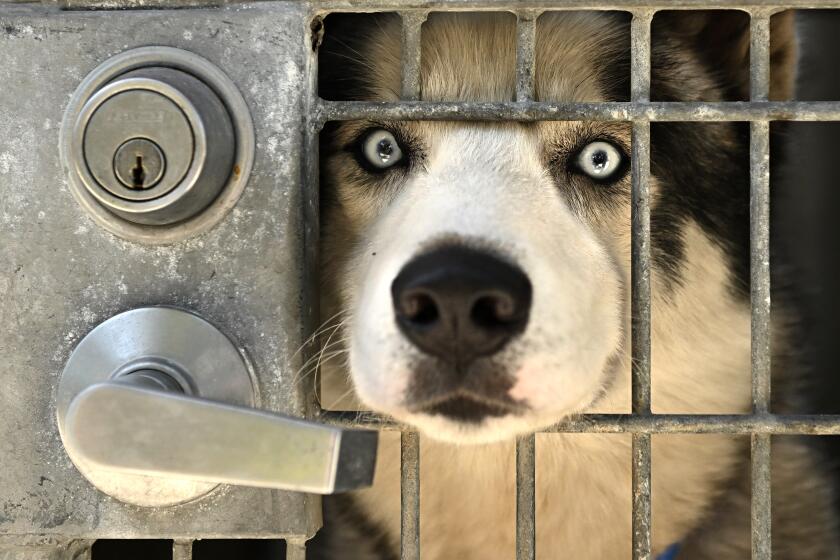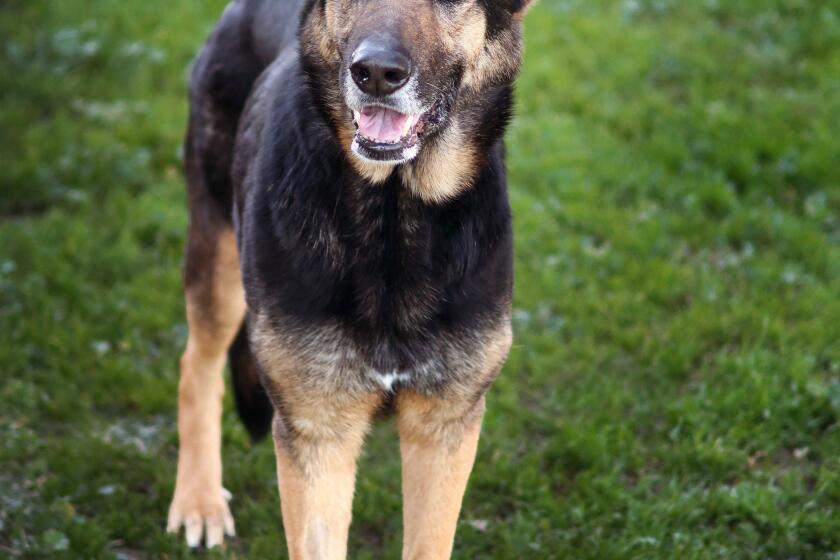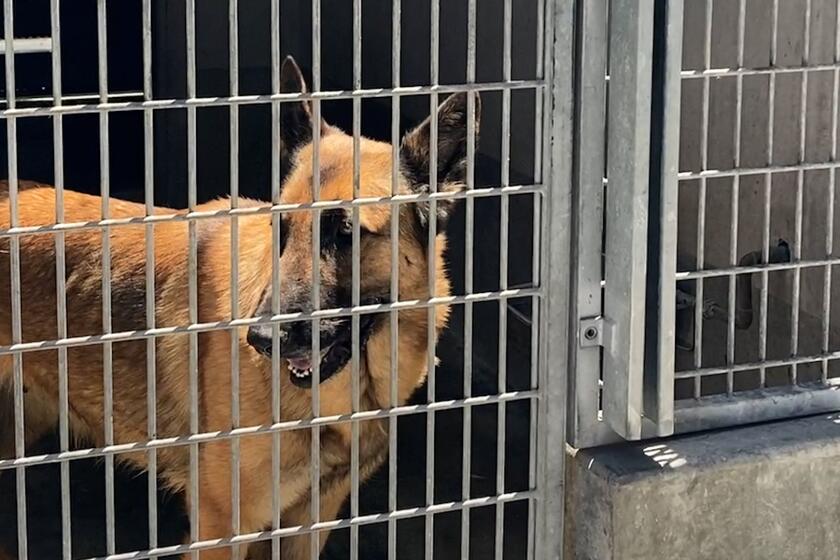Top leadership in flux at troubled L.A. Animal Services department as general manager takes unexplained leave

The general manager of the troubled Los Angeles Department of Animal Services is taking a two-month leave of absence and the department’s board president is out following a tumultuous board meeting last month.
At the same time, a new internal report on conditions at two shelters has found some “failures of appropriate care” that are “deplorable and inexcusable by any reasonable standard.”
The developments mark the latest drama for Animal Services, which is underfunded and understaffed relative to the increasing number of animals that are passing through its six shelters.
Dog euthanizations are up sharply this year, according to department records. In all, 140 dogs were euthanized in June, a 82% percent increase compared to the same time last year.
Activists and city officials say there is an overcrowding crisis at shelters, where animals are living in “deplorable” conditions.
General Manager Staycee Dains didn’t respond to a message left for her Thursday. She previously worked for the city of Long Beach.
A spokesperson for City Controller Kenneth Mejia told The Times that Dains’ leave started on Aug. 13 and that the office had no other information about her absence. A separate internal city document viewed by The Times stated that Dains’ leave would last until mid-October.
Assistant General Manager Annette Ramirez will serve as acting general manager of the department during Dains’ absence, according to a memo she sent to staff Friday. Ramirez previously held the role of general manager on an interim basis before Dains was hired by Mayor Karen Bass last year.
Upon taking office in 2022, Bass vowed to turn around the Animal Services department, which has long faced staffing shortages and crowded conditions. The department runs public shelters and relies heavily on volunteers to care for dogs, cats, rabbits and other animals.
For many volunteers in L.A.’s animal shelters, there is a sense that the city’s shelter system will break down unless something changes.
Bass appointed James Johnson to the Animal Services Commission in spring 2023. He told The Times on Friday that he left the commission on July 31, and declined to elaborate on his departure.
“The bottom line is that when you are a commissioner, you serve at the pleasure of the mayor,” Johnson said. “I am no longer a commissioner. “
Johnson, a former union worker, chaired his first meeting as commission president last month, but the proceedings quickly turned into a spectacle.
First, Johnson angrily chastised a public speaker who criticized Dains, and the meeting was temporarily halted. Then Johnson unsuccessfully tried to convince his fellow commissioners to pass a $25,000 contract for “safety and engagement” services backed by Dains, and offered to raise the funds himself after commissioners expressed concern about the expenditure.
Meanwhile, a new assessment provides a stark look at shelter operations.
L.A.’s animal services agency is understaffed and relies on volunteers. At one overcrowded shelter, dogs sit in kennels for weeks or months without being walked.
Best Friends Animal Society’s national shelter support team conducted an assessment of the Chesterfield Square/South L.A. and East Valley shelters in July and August at the request of top department staff.
The Times reviewed the assessment, which found “a failure to incorporate no-kill policies and in some instances a failure to meet minimal humane standards of care.”
Among other things, the report outlined staff issues and a lack of leadership. Representatives for Bass and Animal Services declined to comment on the report.
“During our time there, we witnessed a high volume of residents coming in to adopt, volunteer, and/or foster,” according to the assessment. “Unfortunately, the staff’s distrust of the residents was obvious and that distrust resulted in many people walking away when their offers of support were not accepted.”
Several bills making their way through the California Legislature seek to address overcrowded animal shelters and streamline how animals receive care.
The report said that most dogs get out of their kennels only once every 10 to 14 days. Kennels are cleaned with water hoses, but the dogs aren’t removed during the cleaning process, according to the assessment.
The report found that “lack of human interactions, the daily torment of being sprayed with a hose and around-the-clock confinement cause what would be the [dogs’] normal behavior to quickly deteriorate.”
Asked about shelter conditions, Johnson told The Times that Animal Services has “significant challenges” and is “underfunded.”
“We need as a city to throw our arms around the department and our shelters and do what we can to get these animals adopted,” he said.
More to Read
Sign up for Essential California
The most important California stories and recommendations in your inbox every morning.
You may occasionally receive promotional content from the Los Angeles Times.















